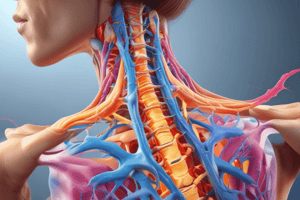Podcast
Questions and Answers
What symptom is associated with the damage to spinal nerve roots in the patient described?
What symptom is associated with the damage to spinal nerve roots in the patient described?
- Inability to stand on toes with the left foot (correct)
- Numbness in the right leg
- Absence of reflex in the right knee
- Pain in the right arm
Which of the following best describes the sensory deficits experienced by the patient?
Which of the following best describes the sensory deficits experienced by the patient?
- 'Pins and needles' sensation running down the left leg (correct)
- Loss of sensation in the right foot
- Numb sensation in the upper back
- Pain radiating down the left leg
What reflex was absent in the patient, indicating potential spinal nerve root involvement?
What reflex was absent in the patient, indicating potential spinal nerve root involvement?
- Triceps reflex
- Patellar reflex
- Biceps reflex
- Left Achilles tendon reflex (correct)
Which part of the nervous system contains the spinal nerve roots discussed in the context of injuries?
Which part of the nervous system contains the spinal nerve roots discussed in the context of injuries?
In the context of spinal nerve roots, what does the clinical consequence of injury typically affect?
In the context of spinal nerve roots, what does the clinical consequence of injury typically affect?
Which nerve root is most likely to be affected by a central lumbosacral disc herniation?
Which nerve root is most likely to be affected by a central lumbosacral disc herniation?
What is the term for the sensory region of skin innervated by a nerve root?
What is the term for the sensory region of skin innervated by a nerve root?
In the case of lumbosacral disc herniation, which nerve root is generally preserved?
In the case of lumbosacral disc herniation, which nerve root is generally preserved?
Which type of disc herniation affects the nerve root exiting at that level?
Which type of disc herniation affects the nerve root exiting at that level?
What contributes to the variation seen in dermatome maps?
What contributes to the variation seen in dermatome maps?
Study Notes
Spinal Nerve Roots Overview
- Spinal nerve roots are responsible for sensory and motor functions in the peripheral nervous system.
- They emerge from the spinal cord and exit through openings between vertebrae.
- Damage to spinal nerve roots can cause sensory and motor deficits in specific regions of the body, depending on the affected level.
Dermatomes and Myotomes
- A dermatome is a specific area of skin innervated by a single spinal nerve root
- A myotome is a group of muscles innervated by a single spinal nerve root.
Lumbosacral Disc Herniation
- A lumbosacral disc herniation usually affects the nerve root exiting at the level below the herniation site.
Cervical Radiculopathy
- Cervical radiculopathy affects the nerve roots in the neck and can cause pain, numbness, weakness, and tingling in the arms and hands.
- The most clinically important cervical nerve roots are C5, C6, and C7.
Common Causes of Radiculopathy
- Trauma can cause compression, traction, or avulsion of nerve roots.
- Degenerative changes in the spine can compress nerve roots as a result of bone spurs or disc herniation
- Tumors such as schwannomas or neurofibromas can compress nerve roots.
- Spinal stenosis can cause nerve root pain and weakness.
- Infections (e.g., epidural abscess) can compress nerve roots.
Myasthenia Gravis
- Myasthenia gravis is an autoimmune neuromuscular disease characterized by weakness of skeletal muscles.
- It occurs when antibodies block or destroy acetylcholine receptors at the neuromuscular junction.
- Treatment includes immunosuppressants, acetylcholinesterase inhibitors, and thymectomy in some cases.
Herpes Zoster
- Herpes zoster, also known as shingles, is caused by reactivation of the varicella-zoster virus, the same virus that causes chickenpox.
- It produces a painful, blistering rash that follows a dermatomal distribution.
Clinical Evaluation of Radiculopathy
- History and physical examination: carefully assess symptoms, including pain, numbness, weakness, and reflex changes.
- Neuroimaging studies: MRI is typically the preferred imaging modality to visualize spinal nerve roots and surrounding structures.
- Electrodiagnostic studies: EMG and nerve conduction studies can help confirm the diagnosis and identify the level and severity of nerve root damage.
Studying That Suits You
Use AI to generate personalized quizzes and flashcards to suit your learning preferences.
Related Documents
Description
This quiz focuses on spinal nerve roots, their functions, and their significance in conditions like radiculopathy. It covers dermatomes, myotomes, lumbosacral disc herniation, and cervical radiculopathy, highlighting their clinical importance. Test your understanding of these key concepts in the peripheral nervous system.



